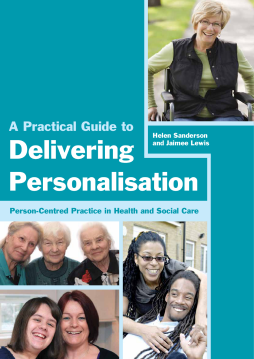
Additional Information
Book Details
Abstract
Personalisation means people, their families and carers having choice and control over their support on a day-to-day basis. To deliver personalised services, professionals and carers need to do more than just hand over financial control: they need to know what is important to a person, the best way to support them, how they communicate and how they make decisions.
This book will show how to deliver personalisation through simple, effective and evidence-based person-centred practice that changes people's lives and helps them achieve the outcomes they want. It covers why person-centred practice is relevant to the personalisation agenda and what person-centred thinking and person-centred reviews are, introducing the tools that can help you carry them out. It also explores the relationship between person-centred plans and support plans, and how person-centred practice can be used in the journey of support through adulthood – from prevention or the management of long-term health conditions to reablement, recovery, support in old age and at the end of life. There is also a chapter on taking a person-centred approach to risk.
This is an essential guide for all staff in health and social care including service providers, managers, practitioners and students.
‘A Practical Guide to Delivering Personalisation offers an excellent way forward to dementia care… [It] puts forward a range of strategies and techniques that may be applied to people with dementia that will allow them to take control of their life, decide what they want, and navigate them towards ways that will allow them to make this possible. […] Rather than just helping people with dementia gain dignity, respect and a sense of well-being, the book helps people with dementia take optimal control of their life and maximise their place as citizens.’
Trevor Adams, founder and Lead Consultant, Passionate Dementia Care
The guide is indeed a practical guide, packed full of ideas and methods that are directly relevant and applicable in the community of a care home. The design and layout of the book are brilliant and the examples and exercises are realistic and lively.
Caring Times
Helen Sanderson and Jaimee Lewis have written a highly practical and useful guide to what is often a confusing topic for many. It is a user-friendly book that provides an accessible introduction to personalisation. It will be useful for health and social care practitioners seeking to deliver personalisation through person-centred care and for academics and students who want an overview of the issues. It brings together a comprehensive collection of practical tools and examples of person-centred planning.
Dawn Brooker, Director of the University of Worcester Association for Dementia Studies, UK
The tools for person-centred care described in the book are excellent... The tools in this book allow for creative records and less use of standardised assessment forms in a one-size-fits-all system. The many practical and technical obstacles to real personalisation are acknowledged because of the long time needed to embed it in practice and the strong financial pressure on all providers.
The International Journal of Person Centered Medicine
The driving ambition for twenty first century support policy and practice is to develop a person-centred approach. What's crucially needed to make this happen are actions and resources which move us from the rhetoric of personalisation to its routine realisation for all. This book provides a key link in that chain by drawing on practical, down-to-earth lived experience to make things real. Every manager and practitioner wanting to work in more person-centred ways should add it to their must-read list.
Professor Peter Beresford OBE, Brunel University and Shaping Our Lives
Helen Sanderson is Director, Helen Sanderson Associates. She has written extensively on person-centred thinking, planning and community building, and co-authored the first Department of Health guidance on person-centred planning, as well as the 2010 guidance 'Personalisation through person-centred planning'. She was the expert advisor on person-centred approaches planning to the Valuing People Support Team. Jaimee Lewis is strategic communications adviser to the Think Local, Act Personal Partnership, the sector-wide commitment to transforming adult social care that follows on from Putting People First. She has worked on communicating the personalisation agenda for several years, following her appointment as an advisor to the Department of Health's individual budgets pilot programme in 2006.
The publication of this book could not be more timely. Whether the reader is experienced in using or providing personalised services or is completely new to the concept, the material here is invaluable. By setting current ideas about person-centred thinking and practice in both historical and ideological context, the text outlines all there is to know about why personalisation is essential to providing high quality support. More crucially perhaps, it also explains clearly how to make it happen.
Steve Carnaby, Consultant Lead Clinical Psychologist with Westminster Learning Disability Partnership and Honorary Lecturer in Learning Disability at Kent University, UK
This well-researched book provides clear practical applicability for managers, practitioners and service providers contending with the somewhat ambiguous nature of enabling individuals to exercise choice in designing and controlling their own support... Sanderson and Lewis convincingly demonstrate the practical contribution person-centred thinking and practice tools can make in delivering personalisation... real congruence between values and practice... Sanderson's reputation to deliver practical focused literature located within an academic, political and ideological context is well deserved.
British Journal of Social Work
